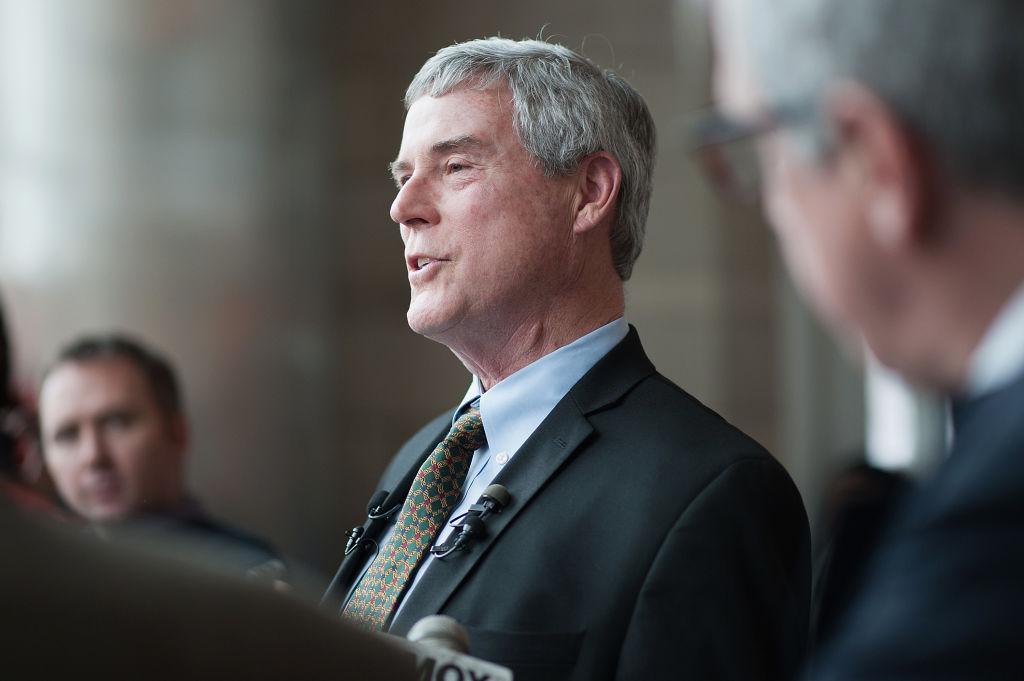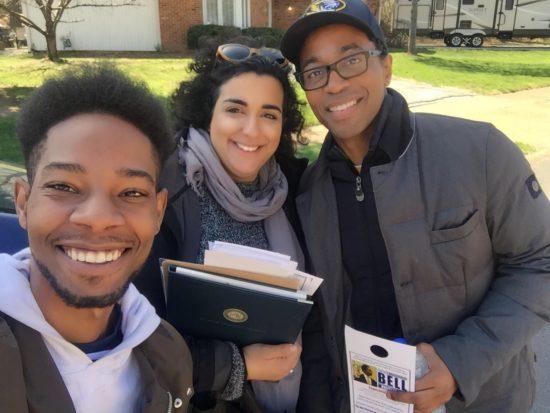St. Louis County Could Oust The Prosecutor Who Helped Ignite Ferguson Protests
His opponent in Tuesday’s primary helped establish new police accountability and court reforms in Ferguson after the police shooting of Michael Brown.

St. Louis County prosecutor Bob McCulloch, who received both national attention and scorn for his handling of the 2014 police shooting of Michael Brown in Ferguson, Missouri, is up for re-election Tuesday, hoping to fend off a reformist challenger for a seat he has held for nearly three decades.
Tuesday’s primary is the first contested race for McCulloch, 67, since his office declined to charge Ferguson police officer Darren Wilson in the shooting death of Brown, an unarmed Black teen. McCulloch’s status as a high-profile, longtime incumbent is expected to work to his advantage in securing an eighth term in office. Still, voters are heading to the polls just two days before the anniversary of Brown’s death—a test of whether McCulloch’s stronghold can withstand pressure from a region that sparked a nationwide reckoning over criminal justice reform.
Challenging him is Wesley Bell, a two-term Ferguson City Council member with experience as a public defender, municipal judge, and prosecutor. Bell rose to prominence in a wave of Black leaders who were elected after the Ferguson protests highlighted a glaring lack of diversity in local government. He has since helped establish new police accountability and court reforms in Ferguson, efforts he now hopes to replicate through countywide office.
“People realize the need for change, they realize the need for criminal justice reform,” Bell, 43, said. “When we talk about reforming the cash bail system or ending mass incarceration, I wouldn’t call those radical. I would call those policies that work and help people.”
The race realigns focus on the fallout from the Ferguson protests and the rounds of criticism that followed McCulloch at virtually every juncture. Early on, McCulloch’s cozy relationship with law enforcement raised questions of his ability to remain impartial. Despite that, he resisted calls to appoint a special prosecutor in the case. He further inflamed critics by taking an unorthodox approach toward the grand jury process, in which his office plied jurors with volumes of documents and testimony, yet never offered recommendations on whether to indict Wilson. McCulloch knew of at least one witness who most likely lied in her testimony, he admitted weeks later. Now, one Ferguson juror is suing for the right to publicly speak out about their experience, which they say contrasts McCulloch’s account of the process.
Compounding the tensions, McCulloch announced the non-indictment decision in a winding speech that pushed late into the evening, a move that sparked rounds of rioting and looting. At no point in his address did McCulloch mention that Brown was unarmed at the time of his death.
“He completely dropped the ball,” Bell said. “I don’t think anyone denies that the way that it was handled was incompetent—at best—and a sign of a need for change.”
McCulloch has stood by his handling of the Brown case. If anything, he has said, his office could have done a better job communicating to the public and explaining the grand jury process. McCulloch did not respond to request for comment.
The prosecutor had shown reluctance to prosecute police officers before Wilson’s case. In 2001, he declined to prosecute two undercover drug officers who fired 21 shots at two unarmed Black men at a Jack in the Box parking lot. McCulloch later concluded that the agents were justified in the shooting, and is on record describing the two victims as “bums.”

Local activists have since responded by trying to force McCulloch out of office. Some filed an ethics complaint against him and his two assistants. Others filed a lawsuit claiming McCulloch “never intended to prosecute” Wilson. Thousands more protested at the ballot box, with 11,000 write-in votes cast against McCulloch during the 2014 general election, even though he ran unopposed that year.
Demonstrations continue to this day. Activists are coming out in support of prominent Ferguson protester Joshua Williams, who was sentenced to eight years in prison after prosecutors from McCulloch’s office asked the court to “make an example” of him for setting fire to a convenience store during a 2014 protest. Last week, a state senator asked the governor to pardon Williams.
McCulloch is also facing pressure for his decision to adamantly defend the 2001 conviction of Marcellus Williams, who was put on death row for the fatal stabbing of a local reporter. In a rare move, the governor stepped in to halt Williams’s execution in light of new DNA evidence that could potentially exonerate him, even as McCulloch maintains there is “zero possibility” he is innocent.
On the campaign trail, McCulloch highlights his nearly three decades in office, noting that Bell has never tried a felony case as a prosecutor. “The public has the confidence in the job I’ve done,” McCulloch said during a candidate’s forum last month. “It takes experience. It takes knowledge. … This is an office that I would put up against any office in the country.”
Indeed, there are signs that the inertia of McCulloch’s incumbency is factoring into the race. The latest local polling, in June, placed McCulloch 18 points ahead of his opponent, with 46 percent of likely voters saying they would re-elect the incumbent. He has also outraised Bell by well over sixfold. According to the latest filings, McCulloch had amassed more than $750,000 in his campaign coffers, compared to Bell’s $120,000.
Activists see Tuesday’s primary as an opportunity to change the culture of an office that has aggressively pursued a “tough on crime” agenda. “Bob McCulloch represents institutional racism in criminal justice,” said Redditt Hudson, vice president of civil rights and advocacy at the Urban League of Metropolitan St. Louis, and one of the four activists who sued to have McCulloch removed from office. “Wesley Bell represents the opportunity to create change.”
The stakes are high for this Democratic primary. Without a Republican on the ballot for county prosecutor, it’s down to only the match between McCulloch and Bell to decide who will advance unopposed for the general election in November. McCulloch has only faced three challengers over the course of his 27 years as St. Louis County prosecutor. No Republican has even appeared on the ballot since 1994. Taking note of that trend, national progressive organizations are stepping in to influence the outcome.
“We understand that Wesley Bell is a huge underdog in this race,” said Arisha Hatch, director of Color of Change PAC, a national group seeking to oust McCulloch. “But folks have gotten away with running unopposed for decades. In this work to reform the criminal justice system, sometimes that means getting involved in primaries and kicking out incumbents.”
